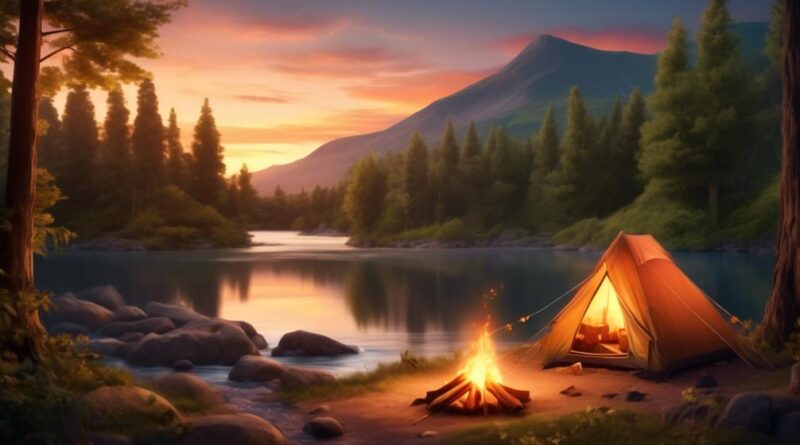Discovering Serene Camping Spots: 9 Helpful Tips
You may think that finding serene camping spots can be challenging, especially with the increasing popularity of outdoor activities. However, with the right approach, discovering these tranquil getaways can become a rewarding and rejuvenating experience.
Imagine being surrounded by nature's tranquility, far away from the hustle and bustle of everyday life. There's something truly remarkable about stumbling upon a camping spot that offers not just a place to stay, but a peaceful sanctuary.
And with these nine helpful tips, you can increase your chances of finding those idyllic camping spots that offer serenity and solitude, allowing you to truly unwind and connect with nature.
Research Quiet Campgrounds
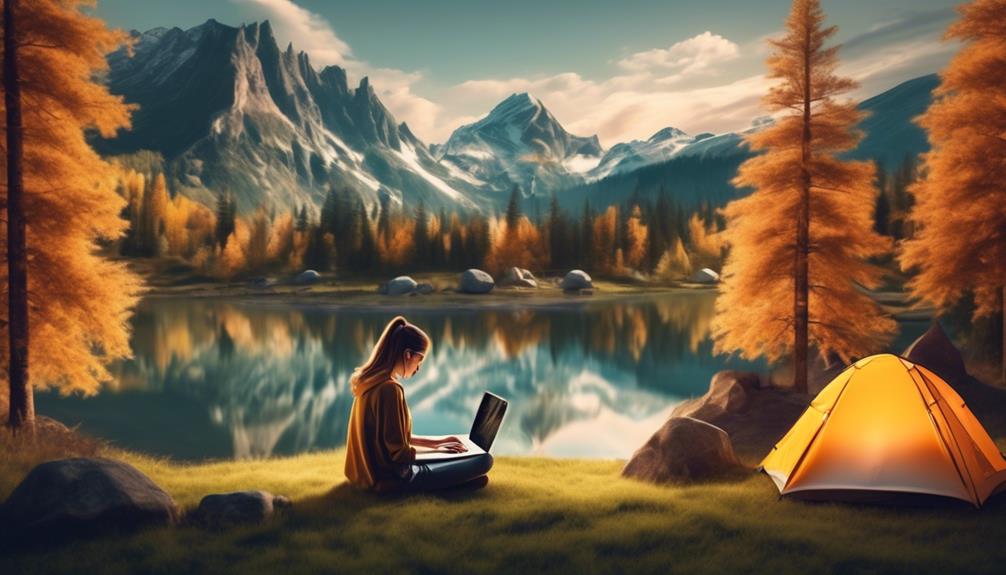
When searching for serene camping spots, consider researching campgrounds located in remote areas away from popular tourist destinations. These hidden gems often provide the perfect escape from the hustle and bustle of everyday life. By seeking out these lesser-known campgrounds, you can immerse yourself in the tranquility of nature without the distraction of crowds and noise.
Remote campgrounds offer a sense of seclusion and intimacy with nature that can be hard to find in more popular camping areas. Imagine waking up to the sound of birds chirping and the gentle rustling of leaves in the wind, with no other sounds to disturb the peace. These remote locations often boast breathtaking natural landscapes and unspoiled wilderness, providing a truly immersive outdoor experience.
In addition to the peaceful surroundings, remote campgrounds often offer a greater sense of freedom and flexibility. Without the constraints of large crowds and busy facilities, you can explore at your own pace and truly connect with the natural environment. Whether you're an avid hiker, a wildlife enthusiast, or simply seeking a quiet place to relax and unwind, these remote campgrounds can cater to a variety of outdoor interests.
Before embarking on your camping adventure, take the time to thoroughly research potential campgrounds. Look for reviews and recommendations from fellow campers to ensure that the remote location you choose aligns with your expectations. With careful planning and consideration, you can discover serene camping spots that offer the peace and tranquility you crave.
Seek Remote Locations
To find remote camping spots, explore off-the-beaten-path locations that offer solitude and unspoiled natural beauty. Seek out destinations that aren't easily accessible by car and require a bit of hiking or backpacking to reach. Here are some tips to help you discover these remote and tranquil camping spots:
- Consult Local Hiking Guides: Look for regional hiking guides or websites that offer detailed information about lesser-known trails and camping areas. These resources often highlight remote locations that are off the radar for most tourists.
- Speak with Park Rangers: Park rangers are a wealth of knowledge when it comes to remote camping spots. They can provide valuable insights into secluded areas within the park that are perfect for a serene camping experience.
- Explore National Forests: National forests often have more lenient camping regulations than national parks, allowing you to find more remote and secluded camping spots. Research specific national forests and their camping policies to find the perfect remote location.
When seeking remote camping locations, keep in mind that these areas may not have amenities such as running water or restroom facilities. Be prepared to practice Leave No Trace principles and bring all the necessary supplies for a self-sufficient camping experience.
Explore National Parks
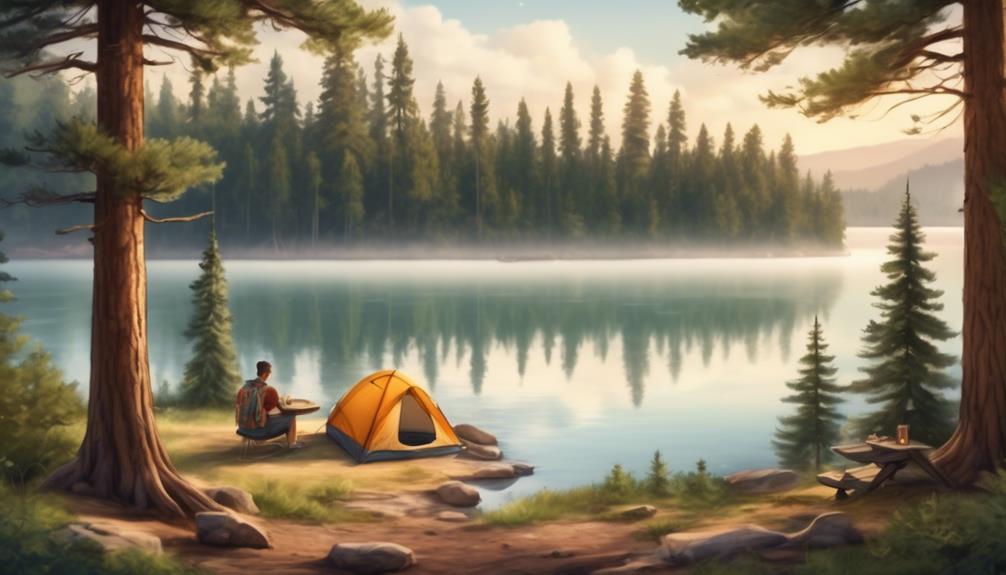
Explore the diverse landscapes and rich biodiversity of national parks to discover picturesque camping spots and breathtaking natural wonders. National parks offer an abundance of serene camping spots, from towering forests to desert oases, where you can connect with nature on a profound level. Each park boasts its own unique charm and attractions, providing an array of opportunities for adventure and relaxation.
As you explore national parks, you'll encounter a wide range of camping options, from developed campgrounds with facilities to more primitive, off-the-grid sites for a truly immersive experience. Many parks also offer backcountry camping, allowing you to venture deep into the wilderness and revel in the tranquility of remote locations.
National parks are home to an astonishing variety of flora and fauna, making them ideal for nature enthusiasts and wildlife lovers. Keep your eyes peeled for elusive wildlife species and marvel at the intricate ecosystems that thrive within these protected areas.
In addition to camping, national parks present a wealth of outdoor activities, including hiking, birdwatching, stargazing, and photography. Whether you're seeking a challenging trek to a panoramic viewpoint or a leisurely stroll through meadows ablaze with wildflowers, these parks cater to all levels of outdoor enthusiasts.
Consider Off-Peak Seasons
Consider planning your camping trip during off-peak seasons to avoid crowds and enjoy a more peaceful and secluded experience in nature. Off-peak seasons offer numerous benefits, including quieter campgrounds, better availability of campsites, and a chance to witness nature's beauty in a more undisturbed setting. Here are some reasons why considering off-peak seasons for your camping trip can enhance your experience:
- Less Crowded Campgrounds
During off-peak seasons, popular campgrounds are often less crowded, allowing you to have more space and privacy. You can enjoy the tranquility of the surroundings without the hustle and bustle of peak tourist times.
- Better Campsite Availability
Off-peak seasons typically mean more availability of campsites, giving you the flexibility to choose the perfect spot for your camping setup. You won't have to worry about competing with other campers for the best locations.
- Enjoy Nature's Serenity
With fewer people around, you can fully immerse yourself in the serene beauty of nature. Whether it's the peaceful sounds of the forest or the unobstructed views of the landscape, off-peak seasons offer a more authentic and undisturbed experience.
Utilize Camping Apps
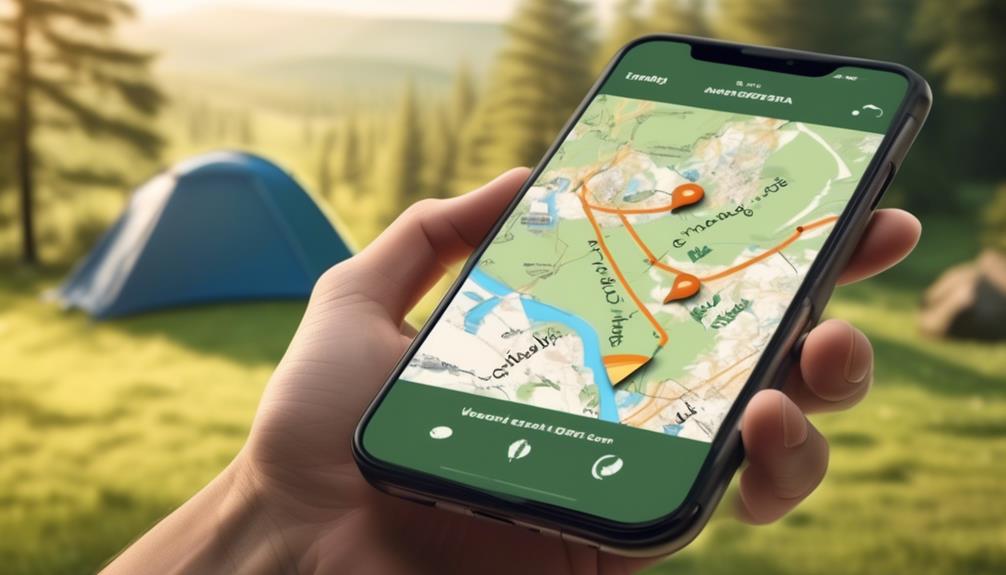
Are you seeking to enhance your camping experience with modern technology? Camping apps can be incredibly useful tools for finding serene camping spots and making the most of your outdoor adventures. With a myriad of apps available, you can easily discover campgrounds, plan your trip, and navigate the great outdoors right from your smartphone.
First and foremost, consider using camping apps to find the perfect camping spot. These apps often provide information about campsite availability, amenities, and user reviews, helping you make an informed decision about where to set up camp. Additionally, many apps offer filters to narrow down your search based on specific criteria such as location, facilities, and activities, ensuring that you find a spot that aligns with your preferences.
Furthermore, camping apps can assist with trip planning by offering features like offline maps, GPS tracking, and suggested hiking trails. This can be especially helpful when exploring remote areas where internet connectivity may be limited. You can download maps and trail information in advance, allowing you to navigate even without a cellular signal.
Moreover, some camping apps provide essential information about wildlife, weather forecasts, and safety tips, ensuring that you're well-prepared for your outdoor experience. By having access to this valuable information at your fingertips, you can stay informed and make the most of your camping trip.
Connect With Local Campers
When using camping apps to find the perfect camping spot, consider connecting with local campers to gain insider knowledge about the area and potentially make new friends who share your love for the outdoors. Here are three ways to connect with local campers:
- Join Online Forums: Look for online camping forums or social media groups where local campers gather to share their experiences and recommendations. These platforms are excellent for asking specific questions about camping spots, hiking trails, and other outdoor activities in the area. Engaging with these online communities can help you tap into a wealth of local knowledge and connect with like-minded individuals.
- Attend Local Events: Keep an eye out for any local camping events, workshops, or gatherings in the area you plan to visit. These events are fantastic opportunities to meet and connect with local campers. You can exchange stories, gather tips, and even form friendships with those who have a deep understanding of the area.
- Talk to Campground Staff: When you arrive at a campground, strike up conversations with the staff. They often have valuable insights into the best spots, lesser-known trails, and local attractions. Additionally, they may be able to introduce you to other campers who frequent the area and are willing to share their knowledge.
Look for Primitive Campgrounds
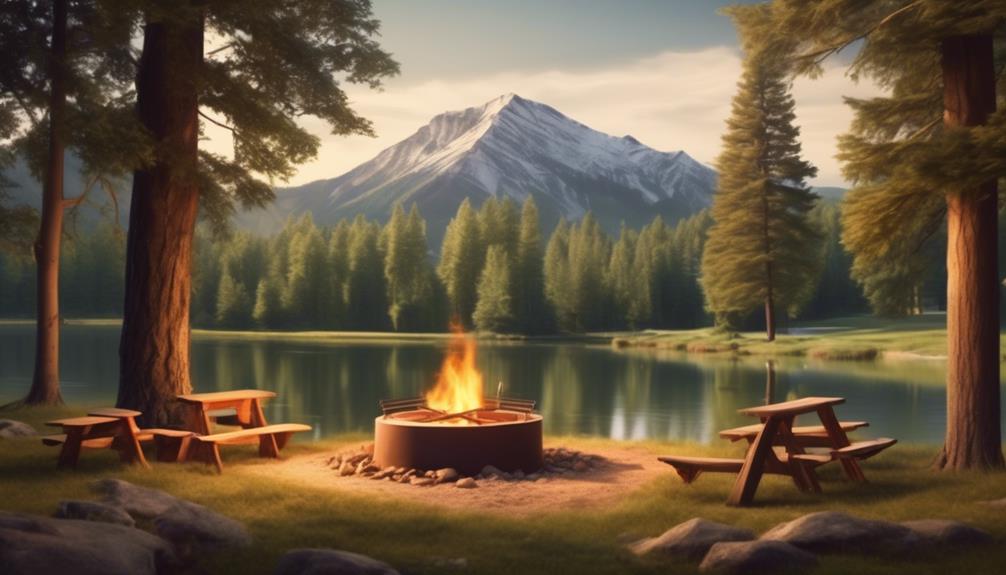
If you're seeking a more rugged and immersive camping experience, consider looking for primitive campgrounds, which offer a back-to-nature setting without modern amenities. Primitive campgrounds provide a unique opportunity to disconnect from the hustle and bustle of daily life and truly immerse yourself in the natural environment.
Here are some helpful tips for finding and enjoying primitive campgrounds.
Firstly, do your research to locate primitive campgrounds in your desired area. Many national and state parks offer primitive camping options, allowing you to find a secluded spot surrounded by nature. These campgrounds often have limited facilities, so be prepared to bring your own water, food, and camping gear.
When choosing a primitive campground, consider the level of solitude you desire. Some campgrounds may be more popular and frequented by other campers, while others offer a more solitary experience. Think about what kind of atmosphere you're looking for and choose a campground that aligns with your preferences.
Be mindful of Leave No Trace principles when camping in primitive areas. Since these campgrounds lack modern amenities, it's essential to minimize your impact on the environment. Practice responsible waste disposal, respect wildlife, and leave the area as you found it to preserve the natural beauty for future campers.
Additionally, be prepared for a more rustic camping experience. Primitive campgrounds may not have restroom facilities or running water, so make sure to bring necessary supplies for hygiene and comfort. Embrace the simplicity of primitive camping and enjoy the serenity of being surrounded by nature.
Check Noise Restrictions
Consider the level of solitude you desire at primitive campgrounds, and make sure to check noise restrictions before choosing a spot for your camping experience. The last thing you want is to arrive at a seemingly peaceful campsite, only to find it's located near a noisy highway or a rowdy group of campers.
Here are some key factors to consider when checking noise restrictions:
- Campground Rules and Regulations:
- Some campgrounds have specific rules regarding noise levels, quiet hours, and the use of generators. Be sure to familiarize yourself with these regulations before setting up camp to avoid any potential conflicts with park rangers or other campers.
- Surrounding Environment:
- Consider the natural surroundings of the campground. Is it located near a lake where noise carries easily across the water? Are there nearby hiking trails or popular fishing spots that may attract noisy crowds? Understanding the surrounding environment will help you gauge the potential for noise disturbances.
- Reviews and Recommendations:
- Take advantage of online resources and camping forums to read reviews and recommendations from previous campers. Look for insights into the overall noise levels, especially during peak seasons. This firsthand information can provide valuable insights into what to expect at a specific campground.
Embrace Backcountry Camping
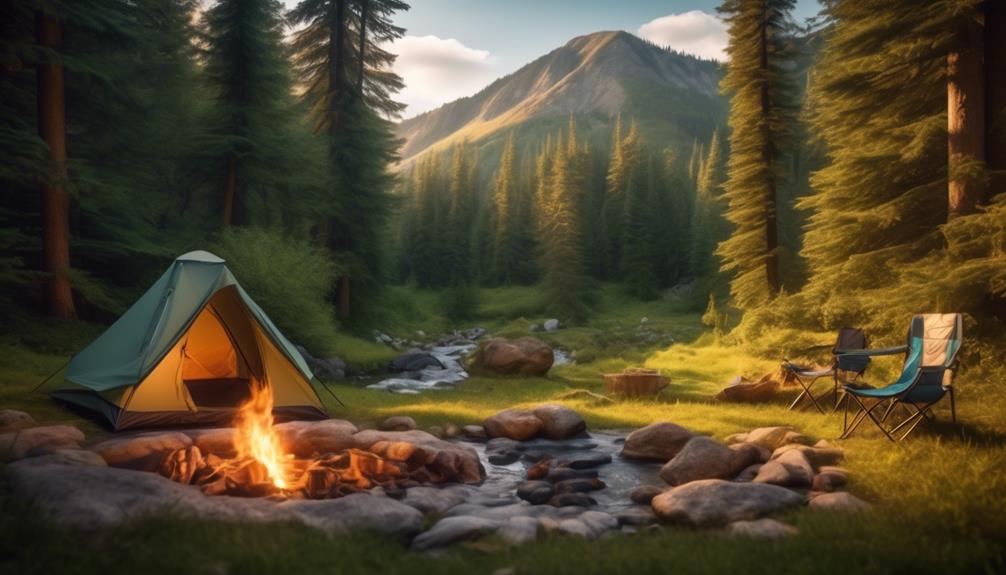
For a true wilderness experience, embrace backcountry camping and immerse yourself in the untamed beauty of nature. Backcountry camping offers the opportunity to disconnect from the hustle and bustle of everyday life and truly connect with the natural world around you. When venturing into the backcountry, it's essential to be well-prepared and mindful of Leave No Trace principles to minimize your impact on the environment.
Before embarking on a backcountry camping trip, research the area's regulations and obtain any necessary permits. Familiarize yourself with the specific rules for the chosen location, including guidelines for campfires, waste disposal, and wildlife interactions. It's crucial to respect these regulations to preserve the pristine nature of backcountry areas.
When selecting a backcountry campsite, prioritize Leave No Trace principles by choosing a spot that shows minimal signs of previous human impact. Opt for durable surfaces such as rock, gravel, or dry grass to set up your camp, and ensure you're at least 200 feet away from water sources to protect fragile ecosystems.
Since backcountry camping entails carrying all your gear to remote locations, invest in lightweight and compact equipment to ease the burden of your load. Additionally, familiarize yourself with basic wilderness survival skills and consider taking a wilderness first aid course to feel more confident and secure during your backcountry adventure.
Embracing backcountry camping allows you to fully immerse yourself in the wonders of nature, providing a profound sense of solitude and serenity that can be difficult to find in more accessible camping areas. By being well-prepared and mindful of your environmental impact, you can enjoy a truly transformative wilderness experience.
Frequently Asked Questions
How Can I Ensure My Safety While Camping in Remote Locations?
To ensure your safety while camping in remote locations, always let someone know your itinerary, pack a first aid kit, bring a reliable communication device, and be aware of the local wildlife and potential hazards.
Are There Any Specific Camping Gear Recommendations for Backcountry Camping?
When backcountry camping, bring a reliable tent, sleeping bag, and backpack. Don't forget essentials like a sturdy stove, water filter, and first aid kit. Always pack light but ensure you have the necessary gear for safety and comfort.
What Are Some Potential Hazards to Be Aware of When Camping in Off-Peak Seasons?
When camping in off-peak seasons, be aware of potential hazards like unpredictable weather, wildlife encounters, and reduced services. Stay prepared with proper gear, check weather forecasts, and familiarize yourself with safety guidelines.
How Can I Find Information on Local Camping Regulations and Restrictions?
You can find information on local camping regulations and restrictions by checking official park websites, contacting local ranger stations, and reviewing government land management websites. Always ensure you're aware of any restrictions before planning your camping trip.
Are There Any Specific Tips for Finding and Booking Primitive Campgrounds?
When booking primitive campgrounds, research beforehand. Look for national forests or Bureau of Land Management areas. Check online platforms or call local ranger stations for availability. Consider off-peak seasons for better chances of securing a spot.
Conclusion
So, if you're looking for serene camping spots, remember to do your research, seek out remote locations, explore national parks, consider off-peak seasons, utilize camping apps, connect with local campers, look for primitive campgrounds, check noise restrictions, and embrace backcountry camping.
With these helpful tips, you'll be sure to find the perfect peaceful camping spot for your next outdoor adventure.
Happy camping!
